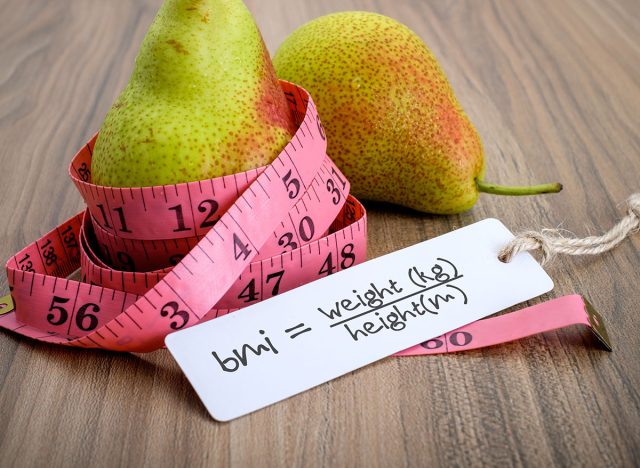Your body mass index, also known as BMI, estimates how much body fat you have. It’s calculated using your weight and height and can indicate how at-risk you are of developing diseases related to obesity and being overweight, according to the National Heart, Lung, and Blood Institute. A high BMI must be taken extremely seriously, as it can lead to type 2 diabetes, high blood pressure, heart disease, sleep apnea, osteoarthritis, and cancer. That’s why we spoke with experts who share their best tips on how to lower your BMI faster.
Lisa Young, Ph.D., RDN, the author of Finally Full, Finally Slim, a nutritionist in private practice, and a member of our Medical Expert Board, explains, “Achieving a healthy BMI is important to decrease the risk of developing chronic conditions such as heart disease, diabetes, and high blood pressure and to improve overall well-being. A healthy BMI indicates a healthy lifestyle with regular exercise and a balanced diet thus contributing to overall quality of life.”
If you want to be proactive and make some changes, keep reading to learn what the experts have to say about how to lower your BMI faster.
Exercise regularly.

Getting in regular physical activity is good for the mind, body, and soul; it helps you avoid many ailments and keeps your body young. It also helps you keep a healthy BMI. According to Young, “Regular exercise is important as it helps burn calories and build muscle which can help lower body fat and increase metabolism. This can lead to a lower BMI as the body composition improves.”
Ellen Thompson, CPT, Blink Fitness, agrees that performing exercise on a regular basis is a crucial aspect of a healthy lifestyle. “Engaging in at least 150 minutes of moderate-intensity exercise per week is essential,” she says. “We recommend exercises like walking, jogging, swimming or cycling. Adding in strength training to build muscle can also be helpful to building your resting metabolic rate.”
Stay hydrated.

You’ve likely heard time and time again that adding water to your day is essential. As Young explains, “Drinking enough water helps regulate appetite and support metabolism. Drinking water before meals also helps reduce calorie intake and helps with weight management.”
Cut out processed foods.

Processed foods such as potato chips, deli meats, hot dogs, frozen pizza, instant soups, and even most breakfast cereals won’t do your waistline any favors. Young encourages you to reduce or eliminate processed foods. “Decreasing the intake of processed foods will help manage calorie intake and contribute to a healthier BMI,” she explains. “Limit processed foods as they are high in added sugars and unhealthy fats, instead focus on whole nutrient-dense foods to get essential nutrients.”
Get sufficient sleep.

Did you know that the quality of your sleep can impact your BMI? “Getting enough sleep is crucial to maintain a healthy metabolism,” Young explains. “Lack of sleep can impact appetite leading to increased hunger and cravings thus contributing to weight gain and higher BMI.”
According to the Sleep Foundation, adults should aim for seven or more hours of restful shuteye each night. If you’re not, it’s time to do something about it. It may be helpful to engage in a relaxing nighttime routine, stick to the same bedtime, and avoid blue light devices, caffeine, and alcohol before sleep.
Maintain a well-balanced diet.

Feeding your body with the nutrients it needs through whole, unprocessed foods is something you should prioritize if you want to lower your BMI. “Consuming a balanced diet provides essential nutrients, helps regulate appetite, and supports healthy metabolism,” says Young. “Consumption of fruits, vegetables, lean protein, and whole grains helps with weight management and promotes overall health.”
Thompson suggests practicing portion control. A foolproof way to do this is by using smaller plates, which can help you avoid overeating.
Get an accurate BMI reading.

It’s always a good idea to meet with a healthcare professional who can accurately weigh you and measure your height. If your BMI is too high, they will come up with the best course of attack that works for you. According to the National Heart, Lung, and Blood Institute, individuals who are considered “overweight” have a BMI of 25 to 29.9, which means they are carrying too much weight for their height. Individuals who are considered “obese” have a BMI of 30 or over, which means their body fat usually always exceeds what it should be based on their height.
Be mindful of your daily movement.

It’s essential to know what your actual daily activity level is. This can prompt you to be more active. A great way to monitor your physical activity is by investing in an activity tracker like a WHOOP band, Fitbit, or Apple Watch. It will track and record all of your daily movements.
Keep a log of what is and isn’t working.

An especially productive way to make improvements in your daily routine is to record your weight and all of the activities you perform on a daily basis. It’s also helpful to log what you’re eating. In this way, you can easily identify what is working to lower your BMI.

